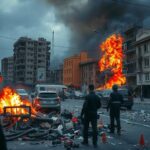Jihadist Rebels Seize Control of Aleppo Amid Renewed Conflict
Jihadist rebels have reportedly gained control of most of Aleppo city, coinciding with Russian air strikes for the first time since 2016. This swift offensive follows a fragile ceasefire in Lebanon and has resulted in over 300 deaths. The situation illustrates the ongoing volatility in Syria, influenced by both local and international dynamics.
According to a report from the Syrian Observatory for Human Rights, jihadist rebels have seized control of a significant portion of Aleppo city, marking the first occurrence of Russian air strikes in the area since 2016. The offensive initiated by rebel groups, including Hayat Tahrir al-Sham (HTS), has unfolded rapidly against the backdrop of a fragile ceasefire in Lebanon. The Observatory detailed that HTS and its allied factions now dominate most of the city, including key government facilities and prisons, following a successful military campaign against the Iranian- and Russian-backed Syrian government forces.
As Russia commenced air raids on Aleppo, the conflict has escalated, resulting in over 300 casualties, including members of the armed groups and civilians. Reports indicate that HTS has gained broader control over other regions, with significant troop movements and military reinforcements bolstering their position throughout northern Syria. In the wake of these developments, local residents reported scenes of celebration among rebel fighters.
The ongoing conflict in Syria has witnessed significant changes over the years, primarily with the influence of various external powers. Aleppo, once a thriving economic center before the war, has been a focal point of clashes between government forces and rebel groups, particularly jihadist factions like HTS. The recent developments signify a shift in control within Aleppo, pointing to a volatile situation exacerbated by external air support, notably from Russia. As rebel groups advance, the complexities of the regional and international dynamics—such as the ceasefire in Lebanon and Turkish involvement in Idlib—are crucial to understanding the current landscape of the conflict.
In summary, the conflict in Aleppo has reached a critical juncture as jihadist rebels have consolidated their control over much of the city, leading to heightened military actions from Russia and significant casualties. The opposition’s rapid advances underscore the ongoing struggle for power within Syria, characterized by external influences and shifting alliances. The situation remains fluid, and the international community continues to observe the ramifications of these developments on the broader Syrian conflict.
Original Source: www.iosconews.com








Post Comment